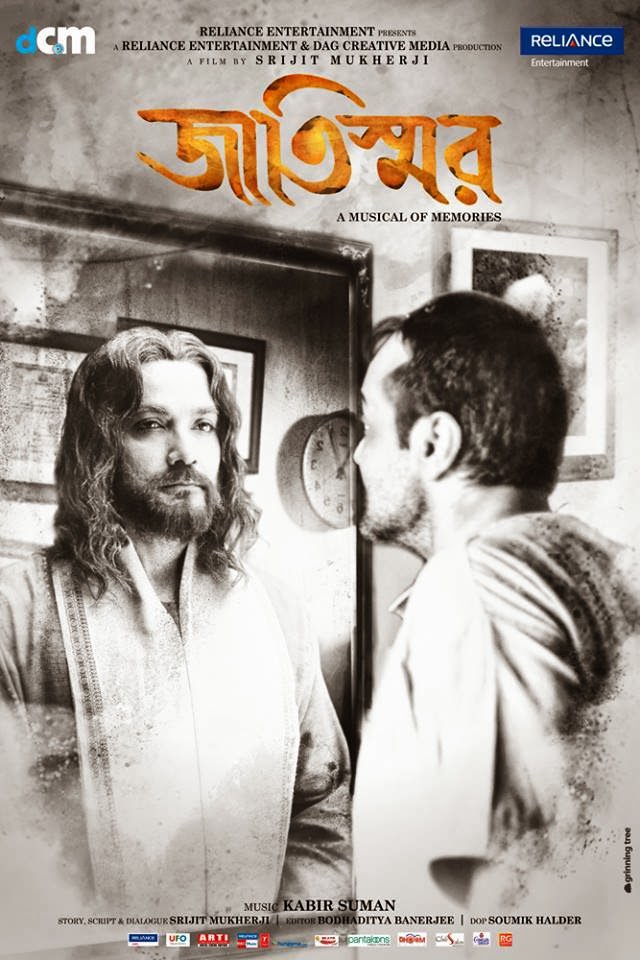
Jaatishwar poster.
Whenever we try to define our inclusion into a particular culture, what we are faced with, other than sorting out our belongingness to multiple identities in a plural society, are questions- questions on an authentic inclusion, questions on how to define who is, in this case, a Bengali.
Are they, who were born with Bengali as their mother tongue, the only ones who can be correctly called Bengalis?
Are those who are born in the fixed political boundaries of a certain region claim to be the only rightful heirs to a culture that’s prevalent in that region?
These are some questions from which Srijit Mukherji’s Jaatishwar, a film which won four National Awards this year, takes off. But then, Mukherji with his trademark cinematic brilliance weaves his answers to these questions into a gripping tale of an early 19th century Bengali poet and musician– Hensman Anthony, popularly known as Anthony Firingee—who had Portuguese origins. Anthony’s story, however, has been narrated in the film parallel to one of a Gujarati boy in Kolkata, who decides to dedicate himself to the learning of Bengali music and the language itself, to woo his love interest, a culturally vibrant girl who has an unwavering adherence to whatever that is “Bengali”.
The girl, played by Swastika Mukherjee, challenges the Gujarati, played by Jisshu Sengupta, to compose a song for her in Bengali if he wants her to even consider the possibility of a relationship. This, strangely enough, leads the guy to pursue music and makes him chose the life of Hensman Anthony for his dissertation topic while doing a course in a Portuguese university. His research takes him to an intriguing man in Chandanagar (a small town in West Bengal near Kolkata)—an assistant librarian in a local library, played by Prosenjit Chatterjee, who claims he was Anthony in his previous birth. And he claims to remember every detail of his last life.
And thus begins the tale of two men, separated by centuries yet aiming for the same goal—to assimilate into what is “Bengali culture”.
But apart from the fascinating storyline, the cinematography—with some of Srijit Mukherji’s distinct trademark shots, the powerful acting by the entire cast and the soulful compositions of Kabir Suman (which earned him a National Award), the element which sets Jaatishwar apart is its cultural significance. For anyone who has followed the Bengali music scene post-1990, Jaatishwar will be as defining a watch as it will be refreshing for those who know the treasure-box of Bengal’s folk culture.
With considerable historical research, Mukherji, while recreating the times of Hensman Anthony, quite effectively captured the musical environment of the early 19th century. Focussing on the kind of musical and poetic performance that Anthony had devoted himself to, Mukherji, in stylish sequences, has shown how, in those times, kavigaans were performed. Backed by Kabir Suman’s compositions, Anthony Firingee sways to the rhythm of traditional instruments while reciting powerful and witty lyrics to defeat Bengal’s renowned performers like Bhola Moira, Ram Basu and Thakur Singh.
Apart from this, the film, also, successfully captures the current Bengali music scene. In fact, the plot is so crafted that important musicians and singers of the contemporary Bengali music scene like Kabir Suman, Anupam Roy, Siddhartha Ray and Rupam Islam feature as themselves in the film. The plot of the film takes into account how these people have helped the music scene of today to take shape. Without knowing the nuances of Bengali music, or rather of the post-90 music scene, it’s meaningless, to a large extent if not completely, to watch Jaatishwar.
At a time when the cultural hegemony of Bollywood and the West dominates popular culture across the country, except the South, Jaatishwar is, no doubt, an important film. At one level it tells a thrilling tale, while at the other, it’s a celebration of Bengali culture, especially its music, with its many variations over time and space. And the fact that the music director and one of the playback singers both won the National Award in their respective categories is suggestive of how evocative the film is from a musical point of view.
To cut a long story short, Jaatishwar in many a way pays tribute to Bengali music, to both its current form and what it was more than 200 years ago. And there lies its significance—because Bengali music is a rich mix, as the young radio jockey Maya, played by Swastika Mukherjee, says, “…there is Bengali music beyond Bengali bands and Rabindra Sangeet…..because to love Bengali music we have to listen to Mohiner Ghoraguli together with Ramprasad.”